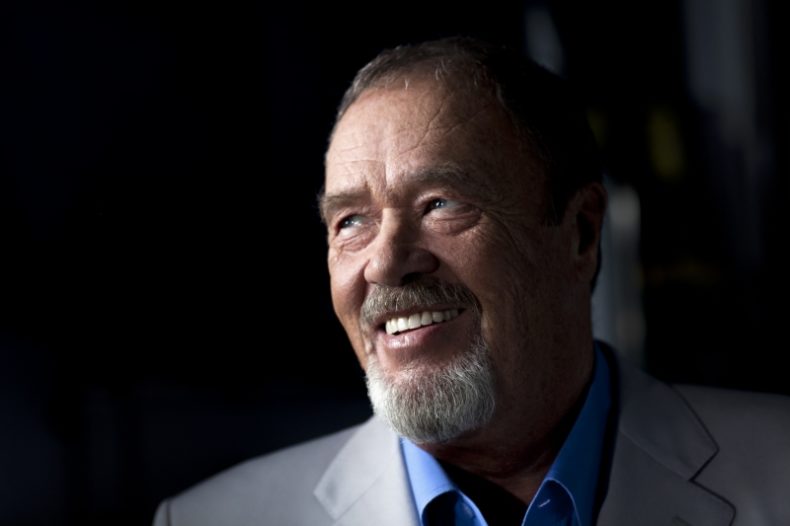INSPIRATION, MOVING FORWARD, AND INVOKING THE DEVIL
A CONVERSATION WITH DAVID CLAYTON-THOMAS
Woodstock headliner. Grammy winner. Road warrior. Creative force. Icon.
What does an artist do, after they’ve done it all? If you’re David Clayton-Thomas, you keep pushing ahead. In a storied career that has spanned five decades, the former Blood, Sweat & Tears front man continues to move forward with the release of his sixteenth solo album, Mobius. On recording the album, he notes, “When I came into the business, they had a position in the record business called the A&R man. He was the guy who would go out and hang out in clubs, looking for new and different sounds. That’s a kiss of death today. They don’t want that. ‘Find us something that sounds like what was successful last month.’ It’s just kind of devouring itself. We refuse to subscribe to that. We continue to make new music and continue to push the envelope.”
Further to his quest for creating new music, Clayton-Thomas muses, “I think my days of doing 200 days a year on the road are over. I did that with Blood, Sweat & Tears for forty years: 150-200 concerts a year for forty years. When I left that band and moved back to Toronto, I said, ‘I’m not going to do that ever again.’ Because Blood, Sweat & Tears, remember, hadn’t recorded in thirty years, there was no incentive to record, because they were making millions of dollars a year on the road, playing the oldies. I had all these songs built up inside, and I was getting nowhere to record them.”
As a solo artist, Clayton-Thomas’ output has been consistently strong and prolific. Not content with merely re-hashing the past, he reflects on what drives him to create. “When I moved back to Toronto in 2005, I decided I was going to make an album a year. I would spend at least half my year in the studio, and leave something of significance, rather that just going out and playing concerts every night, (that) everybody forgets in a day. I’ve been able to pretty much record an album a year, for the past ten or twelve years – every couple of years, when the inspiration strikes.”
Mobius is a stunning album. Eclectic in spirit and stylistically diverse, it is a portrait of the artist: where he has been, and where he is going. From the pensive reminiscence of “Back To The Sixties”, to the gritty urban vibe of “Long Night”, and the sweet samba of “Carnival”, Clayton-Thomas takes the listener on a global excursion. With the powerhouse band of co-producer/bassist George Koller, drummer Larnell Lewis, keyboardist Lou Pomanti, and guitarist Eric St-Laurent, the result is a solid core sound that is beautifully adventurous.
On collaborating with his band members, Clayton-Thomas states, “Keeping the same musicians on every track gave a consistency of sound, even though it may have covered a bunch of different genres, but I’m kind of used to dealing with that. Blood, Sweat & Tears was all over the map – we’d go from Eric Satie to Billie Holliday in the same album. It’s generally the product of a trend that started with Blood, Sweat & Tears, Tower of Power, Chicago – some of those groups. It started in the late ‘60s. Previous to that, rock ‘n’ roll was basically three-chord Chuck Berry rock ‘n’ roll. And then along came the Beatles and George Martin, and they started really pushing the envelope, where you had actually conservatory-trained masters graduates playing rock ‘n’ roll. That just opened everything up – for me, anyway. But it did lead to a wide range of genres that we were approaching. To keep the consistency, and a sound all the way through the record, while still going in all these different musical directions – that’s a challenge. Having the same basic four guys cutting the record from the ground up, I think it kept it very consistent.”
Of his musical collaborators, Clayton-Thomas is effusive. “Most of the musicians that I work with, I have worked with many times before. George Koller has co-produced four albums with me now. He’s my musical director and one of my closest friends. So, George going in was a must. We work at a studio that we have worked at for the last ten years – Number Nine Studios in Toronto – and we’re very comfortable there. It’s a very homey atmosphere there, we know everybody… it’s just a home away from home.
“So, that was the start of it. But I realized that I wanted to keep a very consistent sound throughout the album, so rather than like the Canadiana album, which had thirty or forty musicians playing on it, we decided to stick with a core rhythm section. Of course, Larnell Lewis was a must. We actually delayed the sessions, to make sure that I could get Larnell. He was out with Snarky Puppy. So, we basically had to wait for Larnell to come home, before we started recording.”
“And of course, Lou Pomanti is one of my oldest and dearest friends. Lou produced and arranged my Soul Ballads album, and he was with me in Blood, Sweat & Tears for like, eight years. We traveled the world together. So, we go way, way back. And then, Eric St-Laurent, who is my favourite guitar player in Toronto right now, he’s just a killer player. He’s a virtuoso. He’s just a brilliant guitarist, and he has really taken this town by storm. He’s the most in-demand player. So getting these guys, we had to build a schedule around their schedules, because they’re all high demand players. But we managed to work it out, and booked a solid two weeks in the studio, to cut all the bed tracks. And then, of course, I brought in my horn section – the guys who work with me on the road, like Colleen Allan, Jason Logue, Phil Gray – they’re part of my concert band. It all kind of just fell together.”

As a lyricist, Clayton-Thomas creates work on a variety of topics. “The ideas just come from life. I’ve lived quite a bit of life (my daughter jokes that it’s dangerous to become friends with me, because you’ll end up in one of my songs!) – that, and what’s going on in the world. We live in such a crazy time. Somebody was asking me about the Trump era the other day, and I said, ‘Well, it’s the source of a lot of great material – for comedians, for songwriters, for journalists. The guy is a goldmine of material.’ I don’t know what starts something – a phrase, something that just sticks in my head, and blows into a song.”
A case in point from Mobius is the song “Long Night”, an ode to first responders. “Having been a New Yorker, living through 9/11, I have a tremendous love and respect for those people who put their lives on the line. I wanted to write something about and for them… I had written the song with Lou Pomanti, and I really liked the vibe of it. We actually wrote it based around the tritone. Musically, the tritone is the interval of a siren. It’s a very disturbing interval. It used to be known as “invictus diablicus”, because in the middle ages, it was thought to invoke the devil. In the middle ages, people were put on the rack, tortured, killed, burnt at the stake for using it. ‘To invite the devil!’ That’s all gone by the by now, but the sound of it – I was sitting writing in my home studio, and I could hear the sirens in the street – that interval kind of crept into the song. It ended up that the whole piece is based around the tritone.”
Another song that will resonate with fans, is the album’s opening track, “Back To The Sixties”. What appears at first to be a wistful, nostalgic glance back in time, is actually an honest look at the era of peace and love. When it comes to the ’60s notion of music having the power to effect change, Clayton-Thomas says, “I think that’s part of the theme of the song: what was lost. Back then, we really thought we were going to bring peace to the world. We were going to end the war – which we did… You look back at that entire era, not just Woodstock, (and think) ‘It was all about sex and drugs and rock ‘n’ roll.’ No it wasn’t! That wasn’t what it was all about! I wanted to point that out. There was something very special about that era, and about the activism. Six hundred thousand people didn’t come to Woodstock, New York just for the music. The music was probably the least of it. People were empowered.”
In fact, Clayton-Thomas believes that the sixties’ activist spirit lives on in the youth of today. “I was very inspired by these Parkland kids from Florida. I thought, that’s the first time since the sixties that I’ve seen a bunch of young people get together and say, ‘Enough is enough! We have the power to stop this, because we’re young, and we’re going to be voting for the next fifty years, and you old people, get out of our way!’ The Parkland thing kind of inspired me to write that. It kind of took me back to the Woodstock era, because what was behind Woodstock was more than sex and drugs and rock ‘n’ roll. It was a cause. These kids have a cause, and God bless them.”
While there are no plans to tour in support of Mobius, Clayton-Thomas will be playing select dates to bring his new music to the fans. “I’m going to put a lot of this new stuff into the show. We’re starting in at the cultural centre in Midland (Ontario), on the 28th of July. That’s my home turf.”







